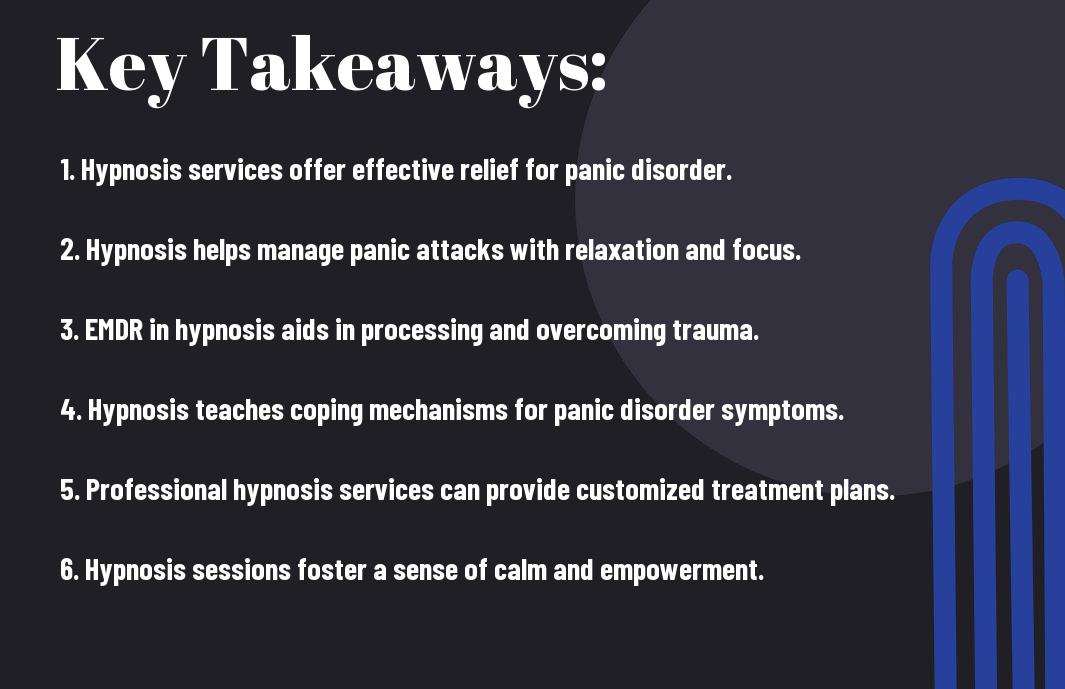Advanced Hypnosis Services for Panic Disorder Relief
Overcoming the overwhelming symptoms of panic disorder can be a daunting task for many individuals. However, hypnosis services can offer a unique and effective approach to finding relief. Through skilled hypnotherapy sessions, individuals can address the root causes of their panic attacks, reducing their frequency and intensity. Unlike traditional treatments, hypnosis research into the subconscious mind to reframe negative thought patterns and promote relaxation, leading to long-lasting results.
Key Takeaways:
- Hypnosis services are a powerful tool for treating panic disorder, providing relief through relaxation and mindfulness techniques.
- Hypnosis can help individuals change negative thought patterns, bringing about a sense of calm and control during panic attacks.
- EMDR, a form of therapy often used in conjunction with hypnosis, can help individuals process traumatic experiences and reduce panic symptoms.
- Both hypnosis and EMDR offer a holistic approach to addressing panic disorder, focusing on the mind-body connection.
- By utilizing hypnosis services for panic disorder relief, individuals can experience long-lasting benefits and a renewed sense of well-being.
Understanding Panic Disorder
Definition and Symptoms
The disorder known as panic disorder is characterized by the sudden and recurring onset of intense feelings of fear and anxiety, often accompanied by physical symptoms such as heart palpitations, shortness of breath, and dizziness. Individuals with panic disorder may experience a sense of impending doom or loss of control during a panic attack.
Prevalence and Impact
With prevalence rates as high as 2-3% of the population, panic disorder can have a significant impact on an individual’s quality of life, relationships, and overall well-being. The fear of experiencing another panic attack can lead to avoidance behaviours that limit daily activities and may result in social isolation.
Individuals with panic disorder need to seek treatment to manage symptoms and improve their quality of life. Conventional approaches to treatment often involve medication and therapy to help individuals cope with and reduce the frequency of panic attacks.
Common Triggers and Manifestations
Manifestations of panic disorder can be triggered by various factors such as stress, certain phobias, or traumatic events. Common manifestations include chest pain, trembling, sweating, and a feeling of detachment from reality. These symptoms can be overwhelming and debilitating for those experiencing them.
Conventional Approaches to Treatment
Approaches to treating panic disorder typically involve a combination of medication, such as anti-anxiety or antidepressant medications, and therapy, such as cognitive-behavioural therapy (CBT) to help individuals better understand and manage their symptoms. While these traditional approaches can be effective for some individuals, they may not address the root cause of the disorder.


Fundamentals of Hypnosis
History and Evolution of Hypnotic Practice
To understand the fundamentals of hypnosis, we must investigate its history and evolution. Hypnosis has been used for centuries in various cultures and civilizations for healing and therapeutic purposes. From the early practices of mesmerism to the modern scientific understanding of trance states, the art of hypnosis has continuously evolved.
Myths and Misconceptions
To debunk the misconceptions surrounding hypnosis, it is crucial to address the myths perpetuated by popular culture. Contrary to what many believe, hypnosis is not a form of mind control. It is a collaborative process between the hypnotist and the individual, where the person remains in full control of their actions and decisions.
Another common misconception is that only gullible or weak-minded individuals can be hypnotized. In reality, hypnosis is a natural state of focused attention that anyone can enter with proper guidance and willingness.
How Hypnosis Works
Hypnosis works by guiding individuals into a relaxed state where the conscious mind is quieted, allowing the subconscious mind to be more open to suggestions. During this state, the hypnotist can help individuals reframe negative thought patterns and beliefs, leading to positive behavioural changes.
Hypnosis and the Brain: Scientific Insights
Myths surrounding hypnosis and the brain have long been perpetuated, but recent scientific studies have shed light on the profound effects hypnosis can have on brain activity. Research shows that during hypnotic states, there is increased connectivity between different regions of the brain, leading to enhanced focus, creativity, and receptiveness to change.
Hypnosis as a Therapeutic Tool
Once again, hypnosis proves its effectiveness as a powerful therapeutic tool in providing relief for individuals suffering from panic disorder. With the guidance of a trained hypnotherapist, patients can experience profound changes in their thoughts, emotions, and behaviours through the use of focused attention and suggestion.
Principles of Hypnotherapy
One of the key principles of hypnotherapy is the concept of bypassing the critical faculty of the conscious mind to access the subconscious where deep-seated beliefs and patterns reside. By entering a relaxed state of heightened suggestibility, individuals can explore and reframe their innermost thoughts and feelings under the guidance of the hypnotherapist.
Techniques and Modalities
One imperative technique in hypnotherapy is the use of imagery and visualization to create positive mental images that can counteract negative thought patterns associated with panic disorder. Additionally, modalities such as progressive muscle relaxation and neuro-linguistic programming (NLP) can be incorporated to enhance the therapeutic process.
To further personalize the treatment, hypnotherapists may also utilize techniques like age regression to uncover early experiences contributing to the development of panic disorder and facilitate healing at a deeper level.
The Hypnotic Trance and Therapeutic Alliance
One fundamental aspect of hypnotherapy is establishing a strong therapeutic alliance between the hypnotherapist and the client. This bond of trust and collaboration creates a safe space for the individual to explore their subconscious mind and work towards positive change.
Another imperative component is the induction of the hypnotic trance, where the individual reaches a heightened state of focus and receptivity to therapeutic suggestions. This altered state of consciousness allows for deep exploration and reprogramming of maladaptive beliefs and behaviours related to panic disorder.
Ethical Considerations in Hypnotherapy
With hypnosis services comes great responsibility, and ethical considerations play a crucial role in ensuring the well-being and autonomy of clients. Hypnotherapists must adhere to strict ethical guidelines, including obtaining informed consent, maintaining confidentiality, and promoting the welfare of each individual under their care.
Tool Practicing with integrity and professionalism, hypnotherapists strive to empower clients to harness the full potential of their mind and body in overcoming panic disorder and achieving lasting relief.

Hypnotherapy for Panic Disorders
Many individuals struggling with panic disorders are turning to hypnotherapy as a complementary treatment option. This alternative therapy aims to address the root cause of panic attacks by accessing the subconscious mind and promoting relaxation and stress reduction.
Suitability of Hypnotherapy for Panic Disorder
Disorder: Hypnotherapy can be particularly effective for individuals with panic disorder who are open to exploring their subconscious thoughts and emotions. It can help uncover underlying triggers for panic attacks and provide tools for coping and managing symptoms effectively.
Hypnotherapeutic Techniques for Panic Relief
Suitability: Hypnotherapy techniques for panic relief often involve guided imagery, relaxation exercises, and positive suggestions to reframe negative thought patterns. By accessing the subconscious mind, hypnotherapy aims to create lasting changes in behaviour and thought processes to reduce the frequency and intensity of panic attacks.
With the guidance of a trained hypnotherapist, individuals can learn to identify early warning signs of an impending panic attack and utilize relaxation techniques to prevent it from escalating. Hypnotherapy sessions can empower individuals to take control of their emotions and responses to triggers, leading to a greater sense of calm and confidence.
Setting and Managing Expectations
For: Setting realistic expectations for hypnotherapy is crucial for its success in treating panic disorders. While hypnosis can be highly effective for many individuals, it may not work as a standalone treatment for severe cases of panic disorder. It is important to approach hypnotherapy with an open mind and a willingness to actively participate in the process.
Integrating Hypnotherapy with Other Treatments
Treatments: Integrating hypnotherapy with other treatments such as cognitive-behavioural therapy (CBT) or medication can enhance the overall effectiveness of managing panic disorder. By combining different therapeutic approaches, individuals can benefit from a holistic treatment plan that addresses the multifaceted nature of panic attacks.
Setting realistic goals and collaborating with healthcare providers to create a comprehensive treatment plan can offer individuals a well-rounded approach to managing panic disorder and improving their overall well-being.
Preparing for Hypnosis Services
Choosing a Qualified Hypnotherapist
All individuals considering hypnosis services for panic disorder relief should prioritize choosing a qualified hypnotherapist. It is crucial to do thorough research and ensure the hypnotherapist is certified, experienced, and specializes in treating panic disorders. Look for reviews, ask for referrals and schedule consultations to assess their expertise and approach.
Pre-Session Assessments and Protocols
Preparing for hypnosis services involves undergoing pre-session assessments and protocols to ensure a personalized treatment plan. These assessments help the hypnotherapist understand the client’s specific needs, triggers, and goals, leading to a more effective and tailored hypnotherapy session. Clients must provide honest and detailed information during these assessments for optimal results.
This process is designed to create a safe and supportive environment for the client, enabling the hypnotherapist to develop a customized approach that addresses the individual’s panic disorder symptoms.
Creating a Conducive Environment for Hypnosis
Assessments such as evaluating the setting where hypnotherapy will take place are vital for optimizing the effectiveness of the sessions. Ensuring a quiet, comfortable, and distraction-free environment can enhance the client’s focus and receptiveness to hypnosis, ultimately leading to better results.
For instance, dim lighting, calming music, and a comfortable seating arrangement can contribute to a relaxing atmosphere that promotes deep relaxation and openness to the therapeutic suggestions provided during hypnosis.
Understanding the Role of the Client in Hypnotherapy
Creating a partnership between the client and the hypnotherapist is crucial for successful hypnosis services. Clients play an active role in the process by being open to suggestions, maintaining a positive mindset, and actively participating in the sessions. By taking ownership of their healing journey and embracing the power of hypnosis, clients can experience profound relief from panic disorder symptoms.
The active engagement and collaboration between the client and the hypnotherapist are key components in achieving positive outcomes and long-lasting benefits from hypnosis services.
The Hypnosis Experience
Despite Hypnosis for anxiety, depression, and fear: Does it work? being primarily associated with entertainment, hypnotherapy has gained recognition for its therapeutic benefits in treating various mental health issues, including panic disorder. Hypnosis services offer a relaxing and non-invasive approach to addressing the symptoms of panic disorder, providing relief by tapping into the subconscious mind.
What to Expect in a Hypnotherapy Session
Session: During a hypnotherapy session for panic disorder, the hypnotherapist will guide you into a state of deep relaxation. You remain conscious and in control throughout the session, allowing you to access your inner resources to address the root causes of your panic symptoms.
The Process of Induction
One: The induction process involves the hypnotherapist using relaxation techniques to help you enter a state of heightened focus and suggestibility. This state allows you to be more receptive to positive suggestions and imagery that can help reframe negative thought patterns associated with panic disorder.
Deepening Techniques and Suggestion Work
With hypnosis, deepening techniques are used to enhance the hypnotic state, making the suggestions more potent and impactful. The hypnotherapist may use visualization, guided imagery, and metaphors to help you reframe your perceptions of fear and anxiety, promoting a sense of calm and control.
Post-Hypnotic Strategies for Panic Disorder Management
Disorder: After the hypnosis session, the hypnotherapist may provide post-hypnotic suggestions tailored to manage panic disorder symptoms in daily life. These suggestions can empower you to respond to triggers calmly, use relaxation techniques effectively, and reinforce positive coping mechanisms to prevent panic attacks.
Plus, hypnosis services can offer a comprehensive approach to managing panic disorder, providing long-term relief and improving overall well-being.
Evaluating the Effectiveness of Hypnosis for Panic Disorder
Research and Clinical Studies
Not all panic disorder sufferers may be aware of the potential benefits of hypnosis services for managing their condition. Clinical research and studies have shown promising results in utilizing hypnosis as part of a comprehensive treatment plan for panic disorder. The hypnotic state allows individuals to access their subconscious minds, helping to uncover and address underlying sources of anxiety and panic.
Measuring Outcomes and Progress
For panic disorder patients considering hypnosis services, measuring outcomes and progress is vital to track the effectiveness of the treatment. Therapists often use a variety of tools and assessments to evaluate the impact of hypnosis on reducing panic attacks and increasing overall well-being. These measures can help both the therapist and the client gauge the success of the hypnosis sessions.
Understanding the importance of monitoring progress can empower individuals undergoing hypnosis services for panic disorder to stay motivated and engaged in the treatment process.
Client Testimonials and Feedback
Research suggests that client testimonials and feedback play a significant role in demonstrating the effectiveness of hypnosis for panic disorder. Hearing about the positive experiences of others who have benefited from hypnotherapy can provide reassurance and encouragement for individuals seeking relief from their symptoms. Personal accounts of how hypnosis has helped manage panic attacks can inspire hope and confidence in its potential.
Maintenance and Long-Term Benefits
Measuring the long-term benefits of hypnosis services for panic disorder is crucial for understanding the sustainability of the treatment. Clients may experience not only immediate relief from panic symptoms but also long-lasting improvements in their overall mental health and well-being. For many patients, the ongoing use of hypnosis techniques can serve as a valuable tool for managing stress and anxiety in the future.
Another key benefit of hypnosis for panic disorder is its ability to address the root causes of panic attacks, leading to a more comprehensive and holistic approach to treatment.
Conclusion
With this in mind, hypnosis services can be a valuable tool in providing relief for individuals suffering from panic disorder. Through techniques like hypnotherapy and Eye Movement Desensitization and Reprocessing (EMDR), significant progress can be made in reducing symptoms and improving overall well-being. The effectiveness of these interventions lies in their ability to address the root causes of panic disorder and rewire negative thought patterns, ultimately leading to long-lasting relief.

Utilizing hypnosis services for panic disorder can empower individuals to take control of their mental health, overcome debilitating symptoms, and regain a sense of calm and stability in their lives. By tapping into the subconscious mind and leveraging the power of suggestibility, hypnosis offers a unique and effective approach to managing panic disorder. With proper guidance from a trained professional, individuals can unlock new coping mechanisms and find sustainable relief from their symptoms.
FAQ
Q: What are hypnosis services for panic disorder relief?
A: Hypnosis services for panic disorder relief involve using hypnotherapy techniques to help individuals manage and overcome symptoms of panic disorder, such as anxiety attacks and excessive fear.
Q: How can hypnosis help with panic disorder?
A: Hypnosis can help with panic disorder by addressing the root causes of anxiety, promoting relaxation, and teaching individuals how to respond to triggers in a more positive and controlled way.
Q: What is EMDR therapy and how does it relate to hypnosis services for panic disorder relief?
A: Eye Movement Desensitization and Reprocessing (EMDR) therapy is a type of therapy used to treat trauma and anxiety. When combined with hypnosis services for panic disorder relief, EMDR can help individuals process and heal from past traumas that may be contributing to their panic attacks.
Are hypnosis services safe for treating panic disorder?
A: Yes, hypnosis services are considered safe for treating panic disorder when conducted by a trained and qualified hypnotherapist. It is a non-invasive and natural approach to managing panic disorder symptoms.
What are the benefits of using hypnosis services for panic disorder relief?
A: The benefits of using hypnosis services for panic disorder relief include reduced anxiety and stress, increased feelings of control and empowerment, improved coping mechanisms, and a greater sense of overall well-being and relaxation.
The Official Instagram profile of Mind Spirit Body Hypnosis therapy and advanced hypnotherapy sessions.
About the author: Award-winning Fanis Makrigiannis of Mind Spirit Body Hypnosis therapy is a certified Hypnotherapist and Master Practitioner of Neuro-linguistic Programming with the American Board of Hypnotherapy. Proudly serving Durham Region, The Greater Toronto Area, Peel Region, Ontario, Canada, and the United States of America via Zoom meetings.




